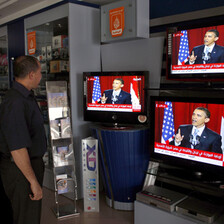Electronic Lebanon 3 August 2006

A view of Balabak village in Lebanon, bombed last night by Israeli forces, August 2, 2006. (MaanImages/Raoul Kramer)
It had always taken my breath away, cresting the ridge from the Beka’a Valley, and descending toward the sea, when I caught the first glimpse of the city of Beirut, framed like a cluster of lustrous pearls against the stunning blue of the Mediterranean. I had traveled that route many times, while studying at the American University of Beirut (AUB) in the early seventies, before the madness of the Lebanese civil war made travel there imprudent.
Anything seemed possible in the Beirut of the seventies - one could meet people from all over the world, buy books in any language, swim in the sea in the morning, escape to the mountains and ski in the afternoon. Newspapers reflected a dizzyingly wide range of perspectives - freedom of the press was a vigorously practiced reality. University students were immersed in politics, from right-wing Lebanese nationalism to pan-Arab socialism, and everything in between. Men and women dressed in traditional Arab clothing and in the most avant-garde European fashions. Food was delectable, always elegantly and generously presented. I joined a multinational Chicago-style blues band that won a devoted following in and around the AUB.
So my breath caught again, earlier this summer, as I approached Beirut from Damascus with my family, returning to the city where I had spent the most enjoyable year of my life.
Beirut had suffered a long, bleak period, but clearly was bouncing back. Just weeks ago I saw it pulsing with life, entrepreneurial drive, and, at the time, World Cup soccer mania. Germany has been particularly kind to Lebanese political refugees. The night it defeated Argentina a riotous party erupted in the city. Our blues band held a reunion concert in AUB’s lovely old chapel to endow a fund to support music at the university, playing to an enthusiastic audience of mixed nationalities and generations. We quaffed Lebanese wines that rivaled those of my home state, California.
Just days after we flew back, all this vivacity was crushed, as Israel brought its iron fist down on Lebanon. The blow had been planned for at least a year, awaiting only the pretext of Hizbullah’s capture of two Israeli soldiers. Hizbullah seized them to trade for Lebanese detainees that Israel had previously refused to release. If Hizbullah indeed attacked inside Israel - some reports initially located the skirmish in Lebanon - it violated Israel’s sovereignty, took Israeli lives, and committed grave wrongs - but did nothing to justify the destruction of a country.
Israel has bombed convoys of medical supplies along the very highway we traveled and destroyed milk factories, grain silos, power stations, the airport, the lighthouse, mosques, churches, bridges, roads, urban residential neighborhoods, and villages. It has killed hundreds of Lebanese civilians and uprooted 500,000 to 700,000 from their homes. Qana, a Lebanese village where 106 civilians were killed in a 1996 Israeli artillery barrage, has again been targeted. This time, the toll is 56, including 37 children.
Israel has a long history of violence against Arab civilians, displacing or otherwise harming two million over sixty years, according to Israeli journalist-historian Tom Segev. In 1948 Jewish troops terrorized 750,000 Palestinian Christians and Muslim into flight. By their numbers and predominant ownership of land, Palestinians were obstacles to establishing the Jewish state. Six decades later, they are still resisting exile and subjugation.
Israel invaded Lebanon in 1982, killing an estimated 18,000 civilians - and ultimately giving birth to Hizbullah. In 2002, Israel pummeled the West Bank, crippling the secular nationalist-led Palestinian Authority - and aiding the rise of Islamist Hamas.
The long-term trend should be obvious: Israel’s violence, no matter the justification, fails to provide Israeli citizens with a sense of security. The Israeli army may beat back Hizbullah temporarily, only to create more numerous and radicalized foes than before. Until recently, Israel faced hostility in Lebanon mainly from Shi’a Muslims, who suffered the most from Israel’s lengthy occupation of South Lebanon. Now it is earning the enmity of countless more Lebanese, who, until two weeks ago, were happy to live in peace with their neighbor.
I wish, one day, that Israeli Jews could crest that ridge, and have their breaths taken away as the magic of Beirut unfolds below them. But they will never see the full beauties of the region they inhabit by dominating others militarily, and denying equal rights to Palestinian Christians and Muslims. Security in the Middle East will only be achieved by respecting rights - to life, dignity, a homeland, and security - for all.
George Bisharat is a professor of law at Hastings College of the Law in San Francisco, and writes frequently on the Middle East. This article was first published in abridged format in USA Today.
Related Links




